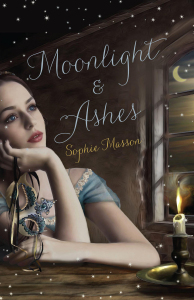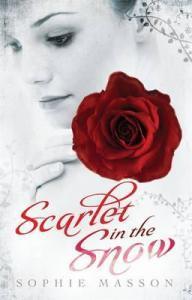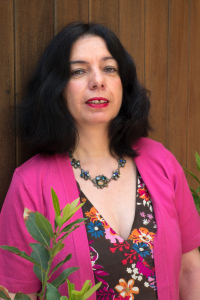Banned Books Month: Guest Post from Sophie Masson: Beware of Once Upon a Time — The Banning of Fairytales
Some years ago, I experienced first-hand what drives some people to demand that books be banned, and stories be censored, even if the works in question are classics, and even if the vast majority of readers love them and consider them to be completely harmless.

Random House Australia, September 2013.
I’d been running an all-day creative writing workshop for gifted kids aged from about 8 to 13, in a public library in Sydney (Australia). I was basing the workshop around well-known fairytales, from Cinderella to The Frog Prince, Beauty and the Beast to Snow White to Little Red Riding Hood. These were stories that had nurtured my own imagination and whose golden threads had found their way into my own books.
The students were wonderful, keen, engaged, lively and imaginative, and they were thoroughly enjoying the exercises I’d devised – creating new plot lines around minor characters, inventing new characters, drawing maps of once-upon-a-time places, imagining what it’d be like to have magic powers. The library had invited parents to come and listen to the workshop if they wanted to, and that’s when trouble struck.
A parent came in when the workshop had been running for about an hour, sat next to her child and looked at his work. I thought she’d be thrilled – he’d been creating some great stuff. Then she jumped up and said, No, no, no! We’re leaving.
Flabbergasted, I asked her what was the matter. Quivering with indignation, she said, We’re Christians and I object to your theme! You’ve been making them write about magic! About fairies and witches and shapeshifters! It’s escapist nonsense and we ban fairytales and all those kinds of stories at home.
I was so taken aback that all I could do was stare as she gathered up her reluctant and dejected son and marched triumphantly out.
Of course, afterwards I thought of all the things I could have said to her. That she had humiliated not only me but her poor son, who had been so enjoying himself. And exactly what did being a Christian have to do with objecting to stories that had been created in a much more deeply Christian time than now? (My own staunchly Catholic parents considered fairytales to be part of our birthright.) I wanted to say that banning the magic of fairytales from your life didn’t chase away monsters, it made them stronger, besides hollowing and greying the world. I wanted to shout, Don’t you realise that in fairytale there’s not only escapism and imagination, but consolation and great wisdom, built up over centuries? Fairytale makes us dream but it also anchors us strongly in the world. How can you want to take that away from your son?
But I was too flustered to say anything. Gathering up the scattered threads of the workshop, my students and I got on with it. The other kids had been bemused by this eruption of the impulse to ban something you don’t understand; but they soon forgot about it in the joy of creating. As to the librarian, she was mortified on my behalf but also a little worried – would the parent take her concerns further? The innocent enjoyment of the day had been spoiled.
It was a graphic example to me of just what power those who seek to ban books can have. In their blindness, they think they alone have the truth. They certainly do not appear to realise that other people have feelings and ideas on the matter. And because such behaviour is so contrary to the way most of us act towards each other, it is intimidating and all too often they get their way.

Random House Australia, October 2013.
But it was also an example of how ridiculous the book-banners often are – and how consistent, too. Fairytales have been a major thread in our culture for centuries. And for all those centuries, fairytales have periodically been subject to banning orders – from those like the parent at my workshop who think that imagining fairies will somehow chase away belief in God, to those who think that they teach the wrong lessons about gender or class; from those who, Gradgrind-like, think children should only have ‘facts, sir, facts!’, to those who think that turning the big bad wolf into a sensitive new age vegetarian is going to somehow protect kids from real-life nightmares. When fairytales were first written down by the likes of Perrault and Grimm, they were attacked for being fit only for uneducated ears. And these days, an untruth is dismissed as ‘a fairytale’, though fairytales actually contain more truth, and deeper truth at that, than most so-called ‘realism’.
For that is how powerful the stories themselves are. Snow White and Cinderella and Little Red Riding Hood and all the enchanted, extraordinary cavalcade of characters in fairytale live deeply in the very heart of humanity. They are part of our culture, inextricably woven into the fabric of our dreams and imagination. That is why they are attacked, and why they are banned by those who live in fear of the imagination, in fear of allowing themselves to dream, to see the world from a different angle, to escape from the grey of habit into the gold of enchanted perception.
Tolkien once said, ‘only jailers fear escapees’. And only those who seek to jail the lifeblood of the human spirit, imagination, could seek to ban such beauty from their own lives – and worse, from that of others.

Sophie Masson.
Sophie Masson was born in Indonesia of French parents and was brought up mainly in Australia. A bilingual French and English speaker, she has a master’s degree in French and English literature. Sophie is the prolific author of numerous young adult fantasy novels as well as several adult novels. She lives in Armidale, New South Wales, with her husband and children. Sophie’s most recent novels are SCARLET IN THE SNOW and MOONLIGHT AND ASHES, both based on fairytales.








